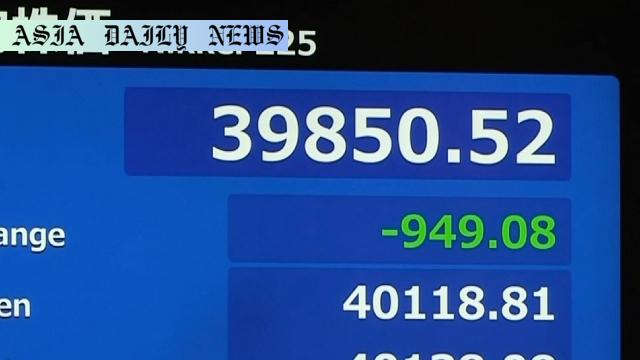Tokyo stocks drop sharply following weak US jobs data release, leading to currency fluctuations as yen strengthens.
- Tokyo stocks fell sharply after disappointing US job data was released.
- The Nikkei 225 Index dropped nearly 2.3%, breaking the 40,000 level.
- Revised US job figures led to anticipations of a rate cut by the Federal Reserve.
- Yen strengthened, with the dollar trading around the 147 yen mark.

Weak US Job Data Shakes Tokyo Stock Market
The Tokyo stock market responded unfavorably to the recently released US nonfarm payroll data, which fell short of expectations. By early Monday trading, the benchmark Nikkei 225 index had plunged sharply, losing more than 900 points or approximately 2.3%. This sudden downturn led the market index to drop below the critical 40,000-point level for the first time in two weeks, sending alarm signals across investors.
The trigger for this market reaction was US Labor Department’s revelation that nonfarm payrolls rose by only 73,000 in July. Not only did this temperature-raising figure show a substantial deviation from predictions, but added to the unease were May and June job data that were substantially revised downward by a combined total of 258,000 jobs. This double blow to expectations has caused jitters in the global financial ecosystem, as investors become increasingly worried about the economic health of the US.
Currency Markets See Strengthened Yen
The US jobs figures had a ripple effect not only on equity markets but also on the currency markets. A weaker-than-expected payroll report fueled further speculations that the Federal Reserve might soon announce an interest rate cut. Such a move would narrow the yield gap between the US and Japan, which had previously been one of the drivers supporting the dollar’s strength against the yen.
As a result, the Japanese yen surged in value. On Monday, the dollar tumbled over three yen from its last recorded trading rate on Friday, settling around 147 yen per dollar. A stronger yen has potential implications for Japanese exporters, already under the looming specter of diminished revenues due to currency appreciation.
Market Reaction in the United States
In parallel, Wall Street witnessed steep declines across its main equity indices as bearish sentiment spilled over. Investors appeared unnerved by the prospect of the US economy being in worse shape than anticipated. Key sectors led a broad-based sell-off, further affirming the fragile environment surrounding financial markets.
Lower job figures typically signal slower growth and weakened consumer spending, both of which are crucial for broader economic performance. Consequently, analysts are focusing their attention on the Federal Reserve’s next move to stabilize markets.
Broader Implications and Global Outlook
The developments in the Tokyo market echo widespread concerns about global economic stability. A sluggish job market in the US, combined with uncertainty surrounding central bank policies, is creating ripple effects throughout the world economy. Emerging markets, reliant on stronger US demand, may feel the secondary effect of economic slowdown in the world’s largest economy.
For now, financial markets appear to be in a wait-and-watch mode. Economic data released in the coming weeks could either reinforce or alleviate fears of a global slowdown. As investors remain cautious, central banks may need to act decisively to mitigate risks of prolonged market disruptions.



Commentary
Impact of Weak US Job Data on Tokyo
The recent market activity highlights a delicate balance that international economies must maintain. The sharp drop in Tokyo stocks underscores the interconnected nature of today’s global financial systems. What happens in the US, particularly with its jobs market, has implications far beyond its borders. A weaker jobs report not only dents confidence within local markets but also sends ripples to major economies like Japan, as evidenced by Nikkei’s plunge.
Yen Strength: A Double-Edged Sword
The strengthening yen, while signaling investor confidence in Japan’s currency, also poses challenges for Japan’s export-reliant economy. A robust yen makes Japanese products more expensive abroad, potentially eroding export competitiveness. This can hurt businesses that are already grappling with subdued post-COVID global demand. Furthermore, as market players anticipate potential Federal Reserve rate cuts, the narrower yield gap may further complicate Japan’s economic growth outlook.
Global Market Implications
It is essential to recognize that the reactions in Tokyo and Wall Street embody a broader apprehension about the global economy. A series of weak indicators from a pivotal hub like the United States sets off alarm bells for economies worldwide. Policies by major central banks, such as those of the Federal Reserve or the Bank of Japan, remain critical in shaping investor sentiment and ensuring global financial stability.
Conclusion
In conclusion, the drop in Tokyo stocks serves as a reminder of how vulnerable global economies are to seemingly localized issues. With ongoing worries about US growth, the focus shifts to policymakers and their response to rising challenges. Close monitoring of upcoming economic indicators and policy decisions will prove crucial in the coming weeks. Maintaining a balance between optimism and precaution will be pivotal for both markets and policymakers in navigating this uncertain period.